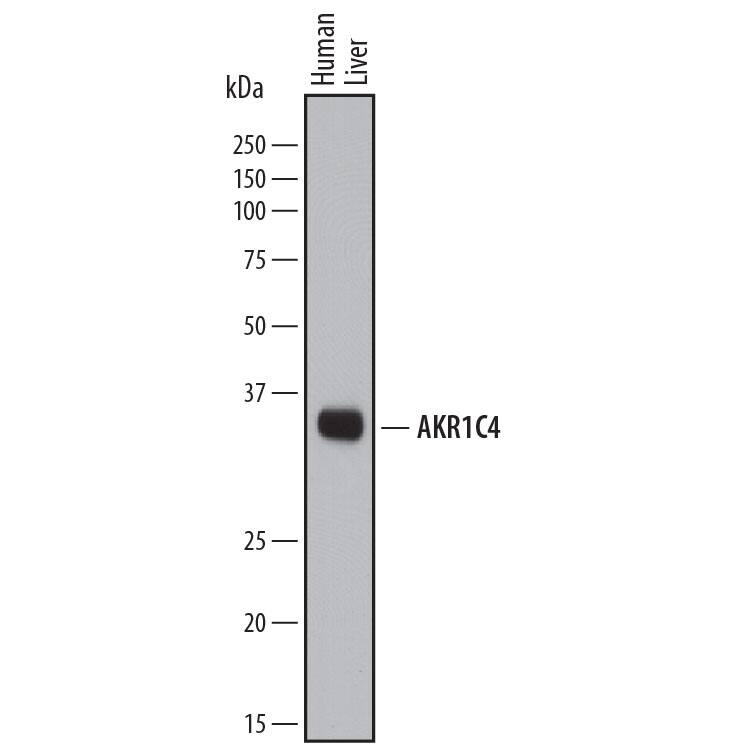Human Aldo-keto Reductase 1C4/AKR1C4 Antibody
R&D Systems, part of Bio-Techne | Catalog # AF6957

Key Product Details
Species Reactivity
Applications
Label
Antibody Source
Product Specifications
Immunogen
Met1-Tyr323
Accession # NP_001809
Specificity
Clonality
Host
Isotype
Scientific Data Images for Human Aldo-keto Reductase 1C4/AKR1C4 Antibody
Detection of Human Aldo‑keto Reductase 1C4/AKR1C4 by Western Blot.
Western blot shows lysates of human liver tissue. PVDF membrane was probed with 0.5 µg/mL of Sheep Anti-Human Aldo-keto Reductase 1C4/AKR1C4 Antigen Affinity-purified Polyclonal Antibody (Catalog # AF6957) followed by HRP-conjugated Anti-Sheep IgG Secondary Antibody (Catalog # HAF016). A specific band was detected for Aldo-keto Reductase 1C4/AKR1C4 at approximately 35-36 kDa (as indicated). This experiment was conducted under reducing conditions and using Immunoblot Buffer Group 1.Applications for Human Aldo-keto Reductase 1C4/AKR1C4 Antibody
Western Blot
Sample: Human liver tissue
Formulation, Preparation, and Storage
Purification
Reconstitution
Formulation
Shipping
Stability & Storage
- 12 months from date of receipt, -20 to -70 °C as supplied.
- 1 month, 2 to 8 °C under sterile conditions after reconstitution.
- 6 months, -20 to -70 °C under sterile conditions after reconstitution.
Background: Aldo-keto Reductase 1C4/AKR1C4
AKR1C4 (Aldo-Keto Reductase family 1 member C4; also 3-alpha HSD1/3-alpha HSD type 1, Chlordecone/kepone reductase/CDR and DD4) is a monomeric, 36-38 kDa member of the four gene 3-alpha HSD family, aldo-keto reductase superfamily of enzymes. AKRs catalyse the reduction of aldehydes and ketones into alcohols through a NADPH-dependent process. The resulting alcohols become the target of subsequent conjugation reactions. AKR1C4 in particular is noted for its action on dihydroxytestosterone, converting it to a less active 3 alpha-diol. In addition, it also converts progesterone into 20 alpha-hydroxyprogesterone, a molecule that both induces GnRH release, and blocks the generation of (deoxy)cortisol from 17 alpha-hydroxyprogesterone. Finally, AKR1C4 likely is involved in the tetoxification of xenobiotics and drugs. AKR1C4 expression is essentially limited to hepatocytes and likely breast epithelium. Human AKR1C4 is 323 amino acids (aa) in length. Full-length human AKR1C4 shares 83% and 76% aa sequence identity with human AKR1C1 and mouse AKR1C4, respectively.
Long Name
Alternate Names
Entrez Gene IDs
Gene Symbol
UniProt
Additional Aldo-keto Reductase 1C4/AKR1C4 Products
Product Documents for Human Aldo-keto Reductase 1C4/AKR1C4 Antibody
Product Specific Notices for Human Aldo-keto Reductase 1C4/AKR1C4 Antibody
For research use only
